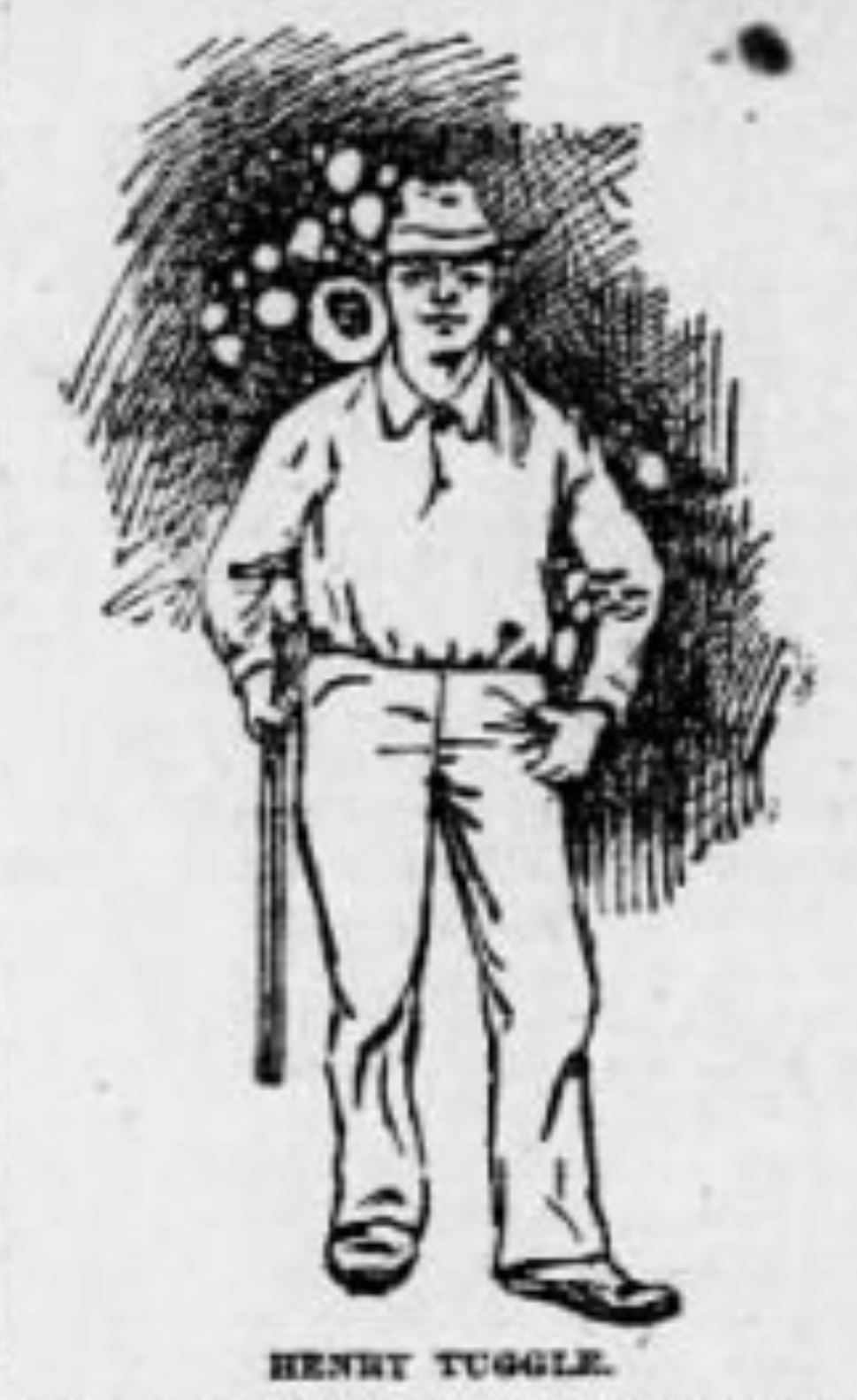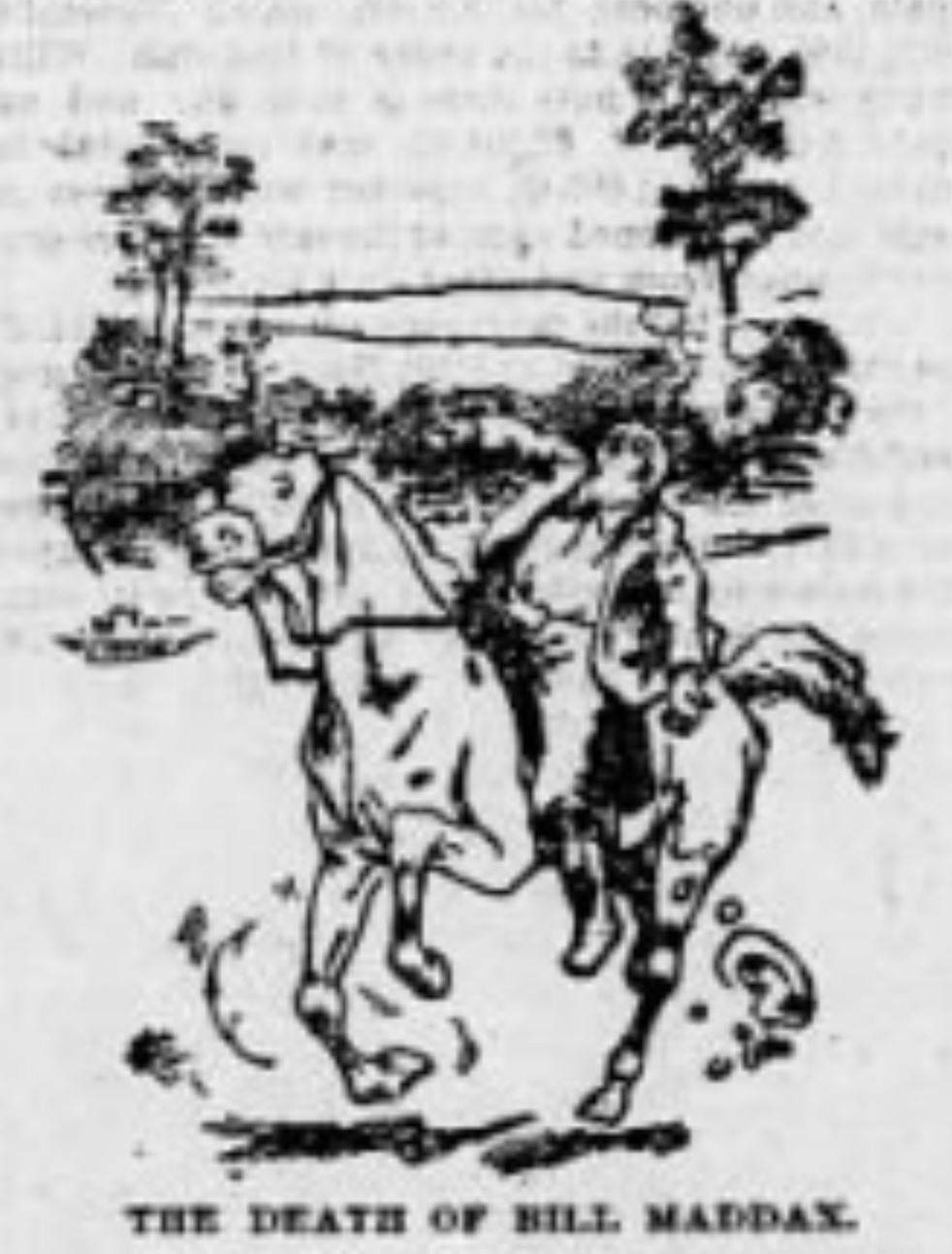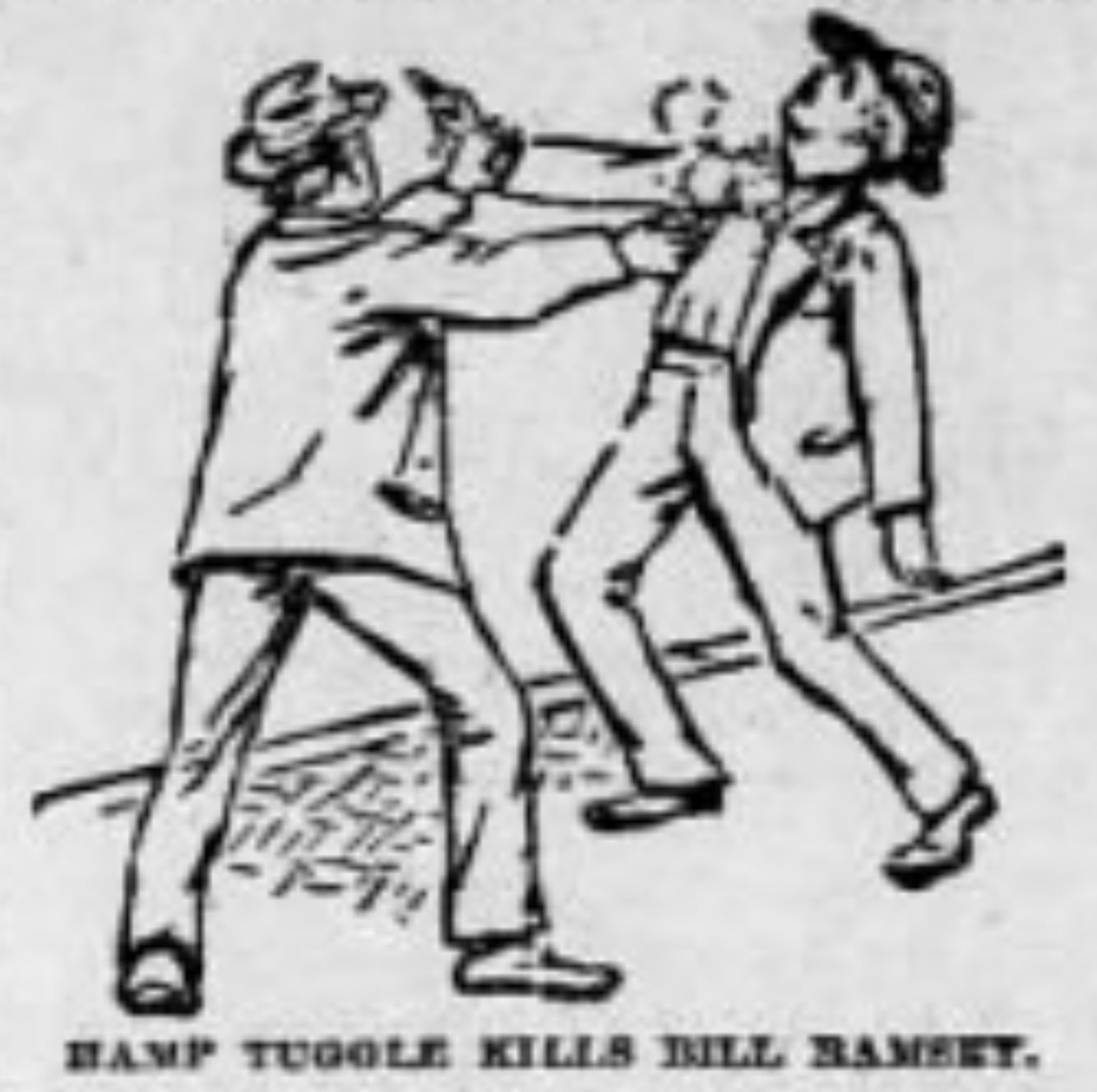
Lake Providence Banner Democrat
“A Bloody Vendetta in Claiborne Parish.”
A BLOODY VENDETTA.
The Tuggle-Ramsey Feud of Clai-
borne Parish, Louisiana.
Ten Killed Since 1891 — The Law Helpless
and the Respectable Element in the
Parish Afraid to Denoune the As-
sassins — The Last Victim
 HE
last murder in the bloodiest Vendetta in modern times was committed
the 20th day of August when Tom Kinder killed John Ferguson on the road from Homer to Trenton. For three years the fight has been on and twenty men have fallen in the conflict. There are two local papers here, but their editors have handled the incidents of the feud in a gingerly manner for fear, I suppose, of getting a charge of shot or a warning to leave town. For that reason nothing is known of it outside of Claiborne parish. The parties from whom I gleamed the facts for this article talked under their breaths and only on conditions that their names be kept secret. They were actually afraid of the few ruffians who perpetrate the vendetta, for their blood is hot and there's no telling what they would do.
HE
last murder in the bloodiest Vendetta in modern times was committed
the 20th day of August when Tom Kinder killed John Ferguson on the road from Homer to Trenton. For three years the fight has been on and twenty men have fallen in the conflict. There are two local papers here, but their editors have handled the incidents of the feud in a gingerly manner for fear, I suppose, of getting a charge of shot or a warning to leave town. For that reason nothing is known of it outside of Claiborne parish. The parties from whom I gleamed the facts for this article talked under their breaths and only on conditions that their names be kept secret. They were actually afraid of the few ruffians who perpetrate the vendetta, for their blood is hot and there's no telling what they would do.
Indeed, things have come to a sorry pass in Homer, the pretty parish seat of Claiborne, these late years. Long before the war it was a rich town and the plantations around it were kept and prosperous. The master and mistress were highly respected people with big mansions and pretty daughters and courtly hospitality. But now there is nothing but ruins to remind one of the old regime — The stately house half tumbled down, with pigs on its veranda and decay staring out of its doors and windows. The “po’ white trash” are found where the wealthy planter once flourished and among them the feud began its sanguinary existence.
The Ramsey and the Tuggle families lived not far from Homer, on the Trenton road. The Tuggle family consisted of five boys and their mother. Of the boys Joe was the most notorious character, and to his account is laid the origin of the feared. He was striking in appearance, more than 6 feet tall and well proportioned with rather handsome features, but was daring and unscrupulous in his disposition. He lived in a house by himself and first grossly offended the moral sense of the community by openly keeping a negro mistress. His reputation for recklessness and hot tempers prevented any interference until he suddenly took a fancy to a young niece and brought her to his house to supplant the negress. Popular indignation at such a proceeding was very strong, but the girl evidently loved her desperate husband, as attempts were made to induce her to leave him without success. Critical remarks came to the sirs of Joe, in connection with Billy Maddox’s name as their author.

Joe then took occasion to quarrel with Maddox about a dog, in which quarrel John Ramsey sided with Maddox.
A few days later a drummer traveling the Trenton road came upon a dead body lying in the road with a charge of buckshot in his back. Investigation showed it was the corpse of Billy Maddox, and that he had been shot from an ambush. Death must have been instantaneous, as there was clinched between his teeth a plum seed and some others in his fingers. Tracks were found leading from the ambush toward Joe Tuggle’s house.
The State offered $1000 for the apprehension of the murderer.
John Ramsey and Tom Kinder set to work to find evidence enough to warrant the arrest of Joe Tuggle.
About this time Joe Gladney, a weak minded associate of Joe Tuggle, was jailed for drunkenness, and while in jail John Ramsey wrung a statement from him that Joe Tuggle had paid him $50 to kill Billy Maddox. The authorities would not accept this as evidence, so when Gladney sobered up he went free and told Joe Tuggle all about his interview with Ramsey.
Immediately after this Ramsey was shot at from ambush, and places where someone had lain concealed were found around his house. Men dressed as women were seen lurking near it. His negro cook was given a powder by Joe Tuggle and was paid to put it in Ramsey’s coffee. He reported all this to the officers, but got no assurance of protection. Finding this the case, he determined to kill Joe Tuggle on site. Tuggle was in Homer one Saturday afternoon and was just starting home. When he approached the East side of the public square John Ramsey stepped from a store with a shotgun calling, “Look out Joe,” and fired at him. Tuggle turned his horse and galloped back across the square and fell with a load of buckshot in his side. Ramsey pursued him on foot, firing several times but without further effect.
Ramsey was caught by the officers, and it required three of them to disarm him. His gun was twisted and broken in the struggle. He was jailed but was instantly bailed out. Tuggle’s wound was not serious, and he was well in a few days. Then it was expected that they would meet again and one or the other fall victim.
During the parish fair Joe and his brother Hamp were in town, and so was John Ramsey. Joe was armed with a Winchester. He was crossing the square when he sighted Ramsey. He called, “Look out John” and opened on him. Ramsey dodged into a store and escaped, but a dancing master named William received the bullet intended for him and fell to the sidewalk mortally wounded. No action was taken against Tuggle by the officers of the law, because, as was evidently the case, they stood in too great fear of him.
Williams was a stranger and had no friends, but popular sentiment at last grew so strong that the officers entered into a parley with the Tuggles. Joe Tuggle consented to give himself up on the promise that he would be allowed a second story room and kept under guard. But he grew weary of confinement and was bailed out on the pretext that confinement would endanger his life.
The grand jury found a true bill against Hamp Tuggle as accessory to the murder of Williams, and he was also released on bail.

All was quiet until court convenient. The first Monday of the term, brothers of the opposing factions who had always been on good terms with each other, undertook to bring about reconciliation. These were Bill Ramsey and Henry Tuggle.
They went to a saloon where Joe and Hamp Tuggle were and entered into conversation and after seemingly smoothing things over, became intoxicated. They separated and the Tuggles went out the back way and Ramsey by the front door. They met again on the sidewalk and quarrel ensued. Bill Ramsey gave Hamp Tuggle the lie, and Hamp struck him in the face. Bill drew his pistol and fired at Hamp striking him in the left hand. Hamp caught Bill’s pistol in his wounded hand and held it to one side while he emptied his own into Bill’s breast. Eye-witnesses sat that Tuggle held him up after he began to fall and still poured bullets into him.

Henry Tuggle got a flesh wound from Ramsey’s pistol.
The Ramsey faction believed the story of bringing about reconciliation was made up for a ruse by which to get Bill Ramsay drunk and kill him. Hamp Tuggle had a steel breast plate made at a blacksmith shop sometime before and the Ramseys say he had it on, and that accounted for Ramsey’s fire being ineffective.
Bill Ramsey’s corpse was taken to his sister’s home, and just before the hour of burial Joe Tuggle and Frank Gill were seen to secrete themselves near the road through which the funeral possession would pass, evidently with the intention of shooting John Ramsey when he rode by.
John got a warning and did not show himself.
John Tuggle and his intimate friend, Newt Glover, were seen going towards Tuggle’s home that afternoon, which people thought meant some new move on the part of the Tuggles.
Next morning John Ramsey’s cook rushed into the house terrified and saying she had seen Joe Tuggle lodge behind a tree. John Ramsey stole around the house to reconnoitre and caught sight of the retreating figure of a man. He fired and the man ran, seemingly wounded.
One night soon after Joe Tuggle and Newt Glover and several of the Tuggle faction were seen to assemble in Frank Gill’s barber shop. Tom Kinder crawled under the floor and overheard them plotting to kill the Ramseys.
He came out and told an officer what he had heard, and asked him to crawl under as he had and satisfy himself. The guardian of the peace declined with thanks and said he did not care for evidence obtained that way.
All was quiet for a few weeks, the conflicting parties in the meantime keeping out of sight and never going by the same road twice in succession, and always traveling by night. The people not mixed up in the feud went their way without fear, but every one was very chary about expressing opinion one way or the other, which would make them a mark for either faction.
One Wednesday morning Joe Tuggle and Newt Glover appeared in town and bought a large quantity of ammunition, saying they were going to kill ducks on the Glover plantaion in the eastern part of the parish.
They completed their supply about noon and started in a wagon on the road to the Glover plantation.
They had gone about three miles, and were crossing Beaver Creek bridge, when they were fired on from ambush, Joe Tuggle was instantly killed by a double charge of buckshot, and his body fell forward in the wagon. Glover was also instantly killed, and dropped over the side of the wagon on the bridge.
The mules ran with the wagon to Mr. Kinnebrew’s, who found Tuggle’s body in the wagon terribly mangled by the buckshot. He went back on the road and found Newt Glover’s body on the bridge. Kinnebrew dispatched a messenger to Homer for the Coroner, who came and found the usual “blind” or ambush from which the shots had been fired. No tracks could be traced from it in any direction. When the inquest was held on Joe Tuggle’s a fresh scar was found on his left arm, calling attention to the statement of John Ramsy that he had hit the man whom he saw prowling around his house fifteen or twenty days before.
These murders occurred on Wednesday, and on Friday Frank Gill and Joe Clingman were warned to leave the parish. They tarried not but went, and their families followed soon after. Their homes are for sale in Homer today.
With Joe Tuggle dead it was hoped the feud would end, as he was the evil spirit of the whole enterprise.
His brother Hamp, who killed Bill Ramsey, made overtures to John Ramsey for peace, but John suspected the treachery which had killed his brother and would not make any promises.

At the time Joe Clingman and Frank Gill were warned to leave the parish Hamp Tuggle also received a warning. He did not obey. He was already in hiding from the officers, and was seldom seen by any one, though it was supposed he was at home every night. A few days after the warning was served his field fence was discovered on fire. Fearing a snare, Hamp did not show himself, but sent one of his negroes to extinguish the flames, believing that even if it was a snare, the negro would be spared, but as the darkey ran towards the fire, he received a charge of shot in his hip. The other negroes were afraid to go to his assistance.
The usual blind was discovered by the officers but no trail could be followed.
For four months there was no further out break and it was thought the feud was ended.
John Ramsey no longer came and went through by-paths under cover of darkness, but took the public road and appeared to have no fear.
One Saturday he paid his usual weekly visit to Homer, at about 6 o’clock started home in his wagon. He was sitting on the backseat with his brother Sam. A negro was driving and a negro girl was sitting with the driver. John had his Winchester across his knees, for he still suspected the treachery of the Tuggles. When they were nearing home a shot rang out from the bushes and then another. John fell forward in the wagon, and his negro driver, being in line of fire fell across him � both dead. Sam sprang out and ran into the woods. On hearing the shot the mules ran away, throwing the negro girl to the ground. The team ran straight home and dashed up to the gate, where the other members of the family found the mangled remains of John and his driver in the bottom of the wagon.
The officers telegraphed for bloodhounds, and on search found the regulation blind. The assassion had disguised his foot prints by nailing pieces of boards to the bottom of his shoes. The bloodhounds came, but the trail was so old when they arrived they could not follow it. It was impossible to apprehend the assassin, but the murder was believed to be the work of Hamp Tuggle.
As soon as the Ramseys can make arrangements to move they left the parish, and again the hope was entertained that all blood was emptied.
Some months past and nothing was heard of Hamp Tuggle. His brother Henry was a peaceful and industrious citizen. One morning he was picking cotton in his field and a shot from the woods nearby mortally wounded him. He lived long enough to say that he saw Tom Kinder shoot him.
Kinder got wind of the statement, and when the officers went after him he had disappeared. Soon after Mrs. Hamp Tuggle began receiving anonymous letters telling her to leave the parish or her sons would be killed. They were boys 19 and 15 years. Her husband, Hamp had never been seen since the murder of John Ramsey.
Murray Tuggle, the younger son, was shot in the leg one night as he was returning to the house from the stable. Afraid to expose her elder son to the assassin the mother mounted a plantation mule and rode to Homer for a surgeon and officers. The bloodhounds were brought, but again refused to follow the trail.
Public indignation had another spasm at this outrageous attack on a boy, and the local papers printed seething editorial on the weakness of the law.
This seemed to have no effect, as not more than three days after John Ferguson a friend and neighbor of the Tuggles, was shot from ambush, and two letters he had on his person for Mrs. Hamp Tuggle were taken. He was returning from Homer, where he had called for the Tuggle mail. It is believed that Tom Kinder killed him to get the letters by which he hoped to locate Hamp Tuggle.
The coroner’s jury returned a verdict that John Ferguson came to his death from a gun in the hands of Thomas D. Kinder. This murder occurred last August.
Kinder is the last of the Ramsey faction and is said to be the most cunning. He is a dead shot and perfectly desperate. Hamp Tuggle is equally as good a shot, and, if possible, more desperate.
These two men are fugitives from the law, each stalking the other in the swamps.

Says the Shreveport Times: “From all information that can be obtained the notorious outlaw, Tom D. Kinder, is still at large in Claiborne parish, notwithstanding the fact that the officers, assisted by a large posse of citizens, and aided by bloodhounds, have tried to run him down. Worse than that, it is claimed that he not only went to his own house (which was left unguarded by the officers) since he made his assault on Mr. A. K. Clingman last Saturday, but he has also been in the very town of Homer on at least one occasion since that event. It seems to be considered by those who are best informed that Kinder has at no time been many miles away from his home, either before or since his attempt to kill Mr. Clingman.
Text prepared by:
- Margaret Boston
- Claire Broussard
- Caitlyn Craddock
- Bruce R. Magee
Sources
“Bloody Vendetta in Claiborne Parish Louisiana in 1893.” Banner Democrat [Lake Providence] 4 Nov. 1893: 4-6. Internet Archive. 16 Mar. 2006. Web. 6 Sept. 2021. <https:// louisiana digital library.org/ islandora/ object/ state-lwp:7104>.
“A Bloody Vendetta.” Gazette [Kansas City] 2 Nov. 1893: 2. Newspapers.com. 28 Aug. 2016. Web. 6 Sept. 2021. <https:// www. newspapers. com/ clip/ 6402753/ tuggle-ramsey-feud/>.
